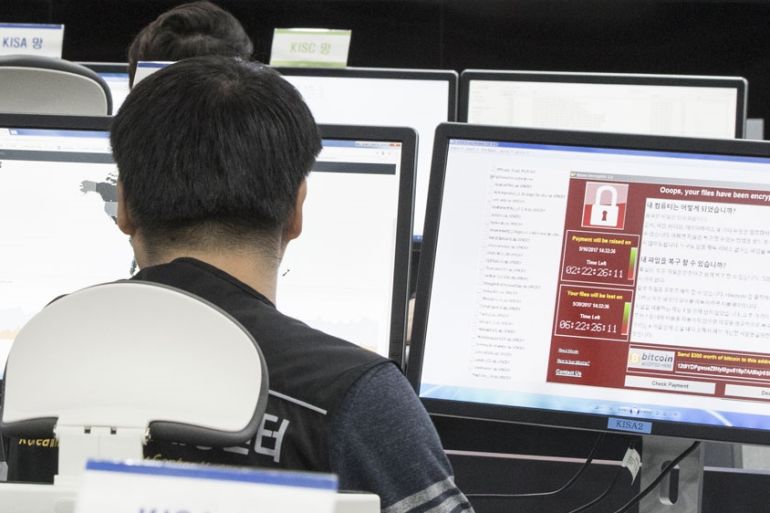US blames North Korea for massive WannaCry cyberattack
Trump administration publicly attributes WannaCry virus to North Korea, calling the attack ‘indiscriminately reckless’.

The United States has for the first time publicly blamed North Korea for being “directly responsible” for the WannaCry cyberattack earlier this year.
The WannaCry virus infected about 200,000 computer systems in 150 countries in mid-May by exploiting vulnerabilities in Microsoft Windows, the most widely used operating system in the world.
Keep reading
list of 4 itemsHong Kong’s first monkey virus case – what do we know about the B virus?
Why will low birthrate in Europe trigger ‘Staggering social change’?
The Max Planck Society must end its unconditional support for Israel
The hack forced British hospitals to turn away patients, affected Spanish companies such as Telefonica, and threw other government agencies and businesses into chaos.
“After careful investigation, the US today publicly attributes the massive ‘WannaCry’ cyberattack to North Korea,” White House Homeland Security Adviser Tom Bossert wrote in an opinion piece in the Wall Street Journal newspaper on Tuesday.
“We do not make this allegation lightly. It is based on evidence. We are not alone with our findings, either. Other governments and private companies agree,” Bossert added.
“North Korea has acted especially badly, largely unchecked, for more than a decade, and its malicious behaviour is growing more egregious … WannaCry was indiscriminately reckless.”
Cybersecurity researchers from Symantec and Kaspersky Lab have said that some code in an earlier version of the WannaCry software had appeared in programmes used by the Lazarus Group, which researchers from many companies have identified as a North Korea-run hacking operation.
“This is the best clue we have seen to date as to the origins of WannaCry,” Kaspersky Lab researcher Kurt Baumgartner told Reuters news agency in May.
Malicious hackers belong in prison, and totalitarian governments should pay a price for their actions, Bossert asserted.
“The rest of us must redouble our efforts to improve our collective defences,” he wrote.
Bossert did not outline the US government’s specific plans to deal with cyberattacks, but officials in Washington said he was expected to do so later on Tuesday.
Marcus Hutchins, a young British computer security researcher credited with derailing the WannaCry attack, was later arrested for allegedly creating and distributing malicious software designed to collect bank account passwords.
Hutchins was detained in Las Vegas on his way back to the UK from an annual gathering of hackers and information security gurus. A grand jury indictment charged Hutchins with creating and distributing malware known as the Kronos banking Trojan.
Such malware infects web browsers then captures usernames and passwords when an unsuspecting user visits a bank or other trusted location.